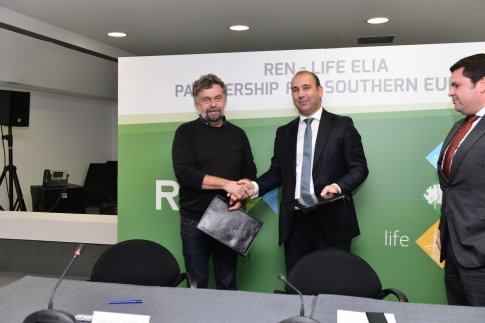News
2015-11-03
Partnership with REN in Lisbon
LIFE Elia team is in contact with REN, the Transmission System Operator of Portugal, since the first steps of the project in 2012. The collaboration evolved towards a partnership agreement signed in Lisbon on November 3rd 2015 (see the video).
Partnership agreement
LIFE Elia and REN (Southern Europe partner) both have experience in vegetation management under overhead high tension lines. Indeed, 5 years ago REN launched a vast program of planting indigenous specious in forest corridors, mainly for reducing forest fire propagation and also to promote biodiversity. Furthermore, REN's COO speech clearly demonstrated how REN is giving importance to nature, finance and social issues.

LIFE Elia and REN committed to exchange on vegetation management best practices. Further, two pilot sites "LIFE Elia-REN" will be implemented on site in Portugal in order to test a mix of approaches from the two partners.

This event has been broadcast in Portuguese national medias (see below the press releases).
Forests of Portugal
In Portugal, 85 % of forest areas belong by private owners. These forest properties are shared among the children of a family. This situation leads to complex ownership landscape : small parcels owned by a large number of owners very much attached to their family land.
Most of the time, these forest parcels generate an income by selling eucalyptus or pine trees to the pulp and paper industry.
And last but not least, two important aspects of vegetation management have to be taken into account :
- Forest fires : national laws imposes safety measures to REN
- Invasive species : Acacia (imported originally for dune stabilisation) is causing a lot of trouble to indigenous species.
On site excursion and planning for pilot site
As an alternative to conventional vegetation clearing in forest corridors, REN must strive to offer solutions which pleased forest owners. Since 2010, REN has started a planting campaign of Stone pine (Pinus pinea), Strawberry trees (Arbutus unedo), and to a lesser extent Chestnut trees (Castanea sativa).

Plantations of stone pine trees

Old Strawberry tree

Strawberry (Medronho)
They all have advantages to provide non timber forest products as an income for owners, and at the same time drastically reduce the work to be done by REN to ensure electrical safety. By planting them with enough space between plants and rows, these trees will rather grow horizontally than vertically, shadowing therefore the ground were problematic trees could grow.

If landowners are not taking care of the plantations, REN is still responsible for removing "undesired" trees and for mulching all branches cut on the spot, as a precaution against fire spreading.
Two pilot sites will be soon selected to test a mix of LIFE Elia vegetation management and plantation of REN. A good way to meet the three pillars of sustainability : economy, human and nature.
A very interesting partnership for both teams !

